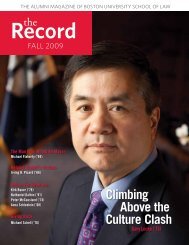the nature of representation: the cherokee right ... - Boston University
the nature of representation: the cherokee right ... - Boston University
the nature of representation: the cherokee right ... - Boston University
Create successful ePaper yourself
Turn your PDF publications into a flip-book with our unique Google optimized e-Paper software.
2005] THE NATURE OF REPRESENTATION 107<br />
A. The Negotiation<br />
III. TREATY OF NEW ECHOTA<br />
A <strong>right</strong> to a U.S. House <strong>of</strong> Representatives delegate is provided to <strong>the</strong> Cherokee<br />
nation under <strong>the</strong> Treaty <strong>of</strong> New Echota. The Treaty was negotiated in December<br />
1835, and later <strong>the</strong> “United States Senate—by a single vote—ratified <strong>the</strong> New<br />
Echota treaty, and President Jackson, on May 23, 1836, proclaimed its validity.” 89<br />
Ra<strong>the</strong>r than being an isolated provision, <strong>the</strong> <strong>right</strong> to a Congressional delegate is<br />
closely related to <strong>right</strong>s granted in earlier treaties. Only through <strong>the</strong> language <strong>of</strong> <strong>the</strong><br />
parties to <strong>the</strong> treaty can <strong>the</strong> intentions underlying such an important <strong>right</strong> be<br />
understood.<br />
1. The Delegate Right<br />
The Cherokees are <strong>the</strong> only tribe with a <strong>right</strong> to a delegate. Article 7 <strong>of</strong> <strong>the</strong><br />
Treaty <strong>of</strong> New Echota creates this <strong>right</strong>:<br />
The Cherokee nation having already made great progress in civilization and<br />
deeming it important that every proper and laudable inducement should be<br />
<strong>of</strong>fered to <strong>the</strong>ir people to improve <strong>the</strong>ir condition as well as to guard and<br />
secure in <strong>the</strong> most effectual manner <strong>the</strong> <strong>right</strong>s guarantied to <strong>the</strong>m in this treaty,<br />
and with a view to illustrate <strong>the</strong> liberal and enlarged policy <strong>of</strong> <strong>the</strong> Government<br />
<strong>of</strong> <strong>the</strong> United States towards <strong>the</strong> Indians in <strong>the</strong>ir removal beyond <strong>the</strong> territorial<br />
limits <strong>of</strong> <strong>the</strong> States, it is stipulated that <strong>the</strong>y shall be entitled to a delegate in<br />
<strong>the</strong> House <strong>of</strong> Representatives <strong>of</strong> <strong>the</strong> United States whenever Congress shall<br />
make provision for <strong>the</strong> same. 90<br />
This <strong>right</strong> has not been abrogated or altered, and consequently, is an existing treaty<br />
<strong>right</strong>. 91<br />
A letter written to <strong>the</strong> <strong>the</strong>n U.S. Secretary <strong>of</strong> War, Joel R. Poinsett, from a U.S.<br />
special agent, J. Mason, Jr., provides key insights into why a delegate <strong>right</strong> was<br />
included in <strong>the</strong> New Echota Treaty and into <strong>the</strong> <strong>nature</strong> <strong>of</strong> that <strong>right</strong>. 92 Mason, who<br />
went in August <strong>of</strong> 1837 on behalf <strong>of</strong> <strong>the</strong> President to a Cherokee council in order to<br />
urge acceptance <strong>of</strong> <strong>the</strong> 1835 Treaty, includes in this letter a general report on his<br />
intentions and observations as well as a transcript <strong>of</strong> a speech he gave to <strong>the</strong> council<br />
89 WOODWARD, supra note 64, at 192. Controversy regarding removal did not<br />
disappear with <strong>the</strong> Treaty <strong>of</strong> New Echota: “John Q. Adams, a member <strong>of</strong> <strong>the</strong> House from<br />
Massachusetts, termed <strong>the</strong> Senate’s acceptance <strong>of</strong> <strong>the</strong> New Echota treaty ‘ “infamous . . . .<br />
It brings with it eternal disgrace upon <strong>the</strong> country.”‘“ Id. at 193.<br />
90 Treaty <strong>of</strong> New Echota, supra note 1, at 482.<br />
91 Following <strong>the</strong> Treaty <strong>of</strong> New Echota, <strong>the</strong> Cherokees and <strong>the</strong> U.S. government<br />
entered into o<strong>the</strong>r treaties that remain valid. See documents cited supra note 2. See also<br />
Blair, supra note 2.<br />
92 Letter from J. Mason, Jr. to Joel R. Poinsett, Sec. <strong>of</strong> War (Sept. 25, 1837), H.R. Doc.<br />
No. 82, at 1-7 (1838), micr<strong>of</strong>ormed on CIS No. 325-H82 (Cong. Info. Serv.).









